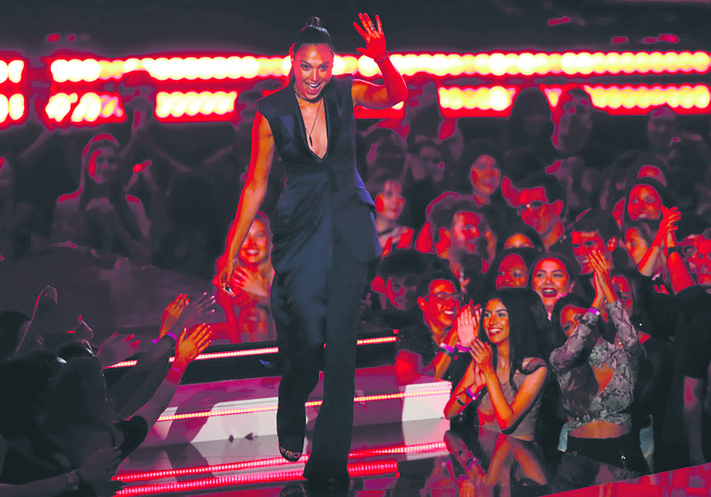The Gal Gadot effect
GAL Gadot is regularly touted as a better ambassador for the State of Israel than the hundreds of Israeli diplomats stationed around the world. And she's arguably the most famous Israeli face on the planet.
Israel’s cultural exports are stronger than ever, with television, food and even celebrities making inroads overseas. But do they really have an impact? Amy Spiro reports.
GAL Gadot is regularly touted as a better ambassador for the State of Israel than the hundreds of Israeli diplomats stationed around the world. And she’s arguably the most famous Israeli face on the planet.
But does the actor’s high-profile job, along with Israel’s increasing cultural visibility, really improve its image in the eyes of the world? Can the success of Israeli television, films, music and food move the hearts and minds of the average onlooker?
The Israeli government seems to think so. The Strategic Affairs Ministry, led by Gilad Erdan, has ramped up the fight against the boycott, divestment and sanctions (BDS) movement in recent years, and has made attempts to counter the online boycott movement a centrepiece of its activities.
Recently, Haaretz reported that Erdan has recruited the Mossad to aid in its activities against the boycott movement.
Mossad or no Mossad, Israeli cultural creations are spreading across the globe rapidly.
HBO recently launched Euphoria, a buzzed-about remake of an Israeli show from 2012. Later this year, another American TV network is slated to air The Baker & The Beauty, a remake of the popular Israeli rom-com by the same name.
Original Israeli creations are reaching millions of new fans around the world. Fauda was one of the first original Israeli shows to garner real traction overseas. Now, viewers are gobbling up Israeli creations such as When Heroes Fly and Shtisel.
Israeli celebrity chefs including Eyal Shani, Assaf Granit and Meir Adoni have opened eateries around the world, winning praise and awards in culinary capitals such as Paris, London and New York.
And with the Eurovision Song Contest in the rear-view mirror and a slate of high-profile concerts – including Bon Jovi, Jennifer Lopez and Lionel Richie – coming up, the BDS movement is having an unsuccessful year.
But how much does this impact Israel’s public image? Can Gadot, Fauda and Eyal Shani’s pitas win over those who feel negative – or even neutral – about the Jewish State?
“I’m not sure how much Gal Gadot changes the overall image just by being a big star, but I think her meeting other big actors, executives, entertainers on a personal level – I think that can only help,” said Ari Ingel, an attorney and the director of the Creative Community for Peace (CCFP), a not-for-profit that works to counter boycott efforts against Israel.
Shayna Weiss, a scholar of Israeli culture and the associate director of the Schusterman Centre for Israel Studies at Brandeis University, said that this is a classic question of “soft power”.
The political science term refers to influencing minds and hearts through non-coercive means, typically through culture, foreign policy and economic influence.
“The question, of course, is how you measure soft power, and can you measure it?” said Weiss. “I don’t think Gal Gadot harms Israel, but do I think Gal Gadot helps Israel much? Not so sure.”
While BDS activity is growing stronger, Israel also continues to notch cultural wins at rapid rates.
Artists including Madonna, Enrique Iglesias, the Backstreet Boys, Ozzy Osbourne, Jason Derulo, Jerry Seinfeld and dozens more have performed for Israeli audiences recently. And each visitor and gig only enrages the BDS movement further.
But Weiss isn’t convinced these visits have a real, long-term effect.
“This type of engagement is somewhat shallow,” she said. “It doesn’t stand up to serious discussion about Israeli challenges.”
When people around the world watch shows such as Fauda and Shtisel on Netflix, the engagement is superficial, she said.
“You’re still talking about the show, you’re not talking about the actual country and the actual conflict,” Weiss remarked.
But Ingel takes a more positive view.
“A show like Fauda is like its own Gal Gadot,” he said. “The more entertainment, film and artists that come out of Israel, it can only have a positive impact. It’s breaking down that barrier of people understanding – people who have never been to Israel, just hear what’s in the news – seeing the sort of art that’s coming out of Israel.”
Undeterred, the boycott movement has targeted the cultural realm in an outsized way over recent years, and found some success.
“They have a very good narrative in Western countries that they’ve certainly locked onto,” said Ingel. “By conflating it – especially in America – with the struggles of African-Americans and social justice issues … they use very nuanced language.”
Ingel surmises that the BDS movement has focused on the cultural realm because of its failures elsewhere.
“They’ve been unsuccessful in big business,” he said. “Google and Intel are flooding into Israel. So I think the BDS movement has found it has had some successes in the college campus space and the cultural sector.”
Ingel pointed to wins for BDS with the cancellation of concerts in Israel by Lorde and Lana Del Rey, but he believes some counteractions only end up amplifying the boycott message.
“I think a lot of people get bogged down in the boycott movement, when the reality is that most Americans don’t even know what BDS is,” he said.
While Eurovision in Tel Aviv in May was subject to incessant campaigns and media coverage of boycott efforts, it went off smoothly and was watched by
182 million viewers, according to the European Broadcasting Union.
“In the end no artists dropped out and no broadcaster pulled out,” said Ingel.
While Israel has notched considerably more wins against the BDS movement in recent years than losses – whether this translates into more global support and understanding for Israel, that may take more than Wonder Woman to ascertain.
THE JERUSALEM POST





comments